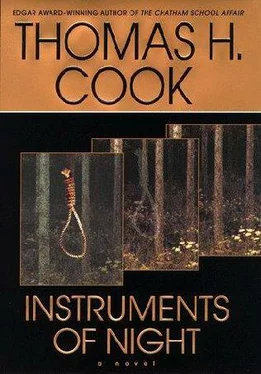Thomas Cook - Instruments of Night
Здесь есть возможность читать онлайн «Thomas Cook - Instruments of Night» весь текст электронной книги совершенно бесплатно (целиком полную версию без сокращений). В некоторых случаях можно слушать аудио, скачать через торрент в формате fb2 и присутствует краткое содержание. Жанр: Триллер, на английском языке. Описание произведения, (предисловие) а так же отзывы посетителей доступны на портале библиотеки ЛибКат.
- Название:Instruments of Night
- Автор:
- Жанр:
- Год:неизвестен
- ISBN:нет данных
- Рейтинг книги:3 / 5. Голосов: 1
-
Избранное:Добавить в избранное
- Отзывы:
-
Ваша оценка:
- 60
- 1
- 2
- 3
- 4
- 5
Instruments of Night: краткое содержание, описание и аннотация
Предлагаем к чтению аннотацию, описание, краткое содержание или предисловие (зависит от того, что написал сам автор книги «Instruments of Night»). Если вы не нашли необходимую информацию о книге — напишите в комментариях, мы постараемся отыскать её.
Instruments of Night — читать онлайн бесплатно полную книгу (весь текст) целиком
Ниже представлен текст книги, разбитый по страницам. Система сохранения места последней прочитанной страницы, позволяет с удобством читать онлайн бесплатно книгу «Instruments of Night», без необходимости каждый раз заново искать на чём Вы остановились. Поставьте закладку, и сможете в любой момент перейти на страницу, на которой закончили чтение.
Интервал:
Закладка:
Two days later those results were reported.
Sheriff Malcolm Gerard told reporters today that Miss Mary Faye Harrison, who was reported missing the night of August 27 and was found in Manitou Cave three days later, was the victim of a homicide. According to the autopsy report, Miss Harrison died by strangulation. Further details were not released, but Sheriff Gerard stated that there was no evidence that Miss Harrison had been sexually assaulted.
For the next few hours, Graves carefully went through the newspaper coverage of everything that had happened after that-the investigation that finally led police to Jake Mosley-taking notes on each detail he thought might later generate a story.
The investigation had been conducted under the direction of Detective Lieutenant Dennis Portman of the New York State Police, and as far as Graves could tell from the subsequent newspaper reports, it had been carried out by the book.
The results of that investigation had been extensively reported in the local press. According to Homer Garrett, the local carpenter in charge of the construction of the second cottage, Mosley had entered the woods at precisely the same spot where Faye Harrison had entered them moments earlier. Mosley had not returned to the cottage for nearly three hours, and according to Garrett, the man had seemed “jumpy and agitated” upon his return.
This had been enough to focus Portman’s attention on Jake Mosley, and over the next few days the State Trooper had been able to accumulate a varied assortment of evidence against the workman. Mosley had been sighted on the same trail where Faye had previously been seen, the paper reported. In addition, under direct questioning Mosley had been unable to give any account of his whereabouts at the time of her death. He claimed he’d taken a walk in the woods, grown tired, then sat down and fallen asleep.
As evidence, all of this was pretty flimsy, as Graves knew, but within a week Detective Portman gathered considerably more incriminating information. Local residents informed him that Mosley had often mentioned the dead girl in vulgar terms, even spoken of “getting her off by herself.”
Nor was this the first time Jake Mosley had exhibited a disturbing interest in young girls. On two previous occasions he’d been found prowling a lovers’ lane, once with an ice pick protruding from his back pocket, once with a twenty-two-caliber pistol in his belt. On both occasions Mosley had been detained by police, then released with a warning that he should stay clear of such areas in the future.
But the single most telling piece of evidence had not been discovered until two weeks after Faye’s disappearance. By then a search warrant had been granted for the room Mosley occupied in a dilapidated men’s boarding-house in Britanny Falls. During the search, police found several pairs of panties in a bureau drawer. Though they had no specific markings, Mrs. Harrison identified one of the pairs as having belonged to her daughter. After initial denials, Mosley finally admitted to having stolen them from the clothesline behind the Harrison house. Yet he continued to deny having had anything to do with Faye’s murder.
After this admission, Mosley had been detained at the local jail for nearly two days, though without being formally arrested. Then, abruptly, on the morning of September 21, he had been released for “lack of evidence.”
Two days later, Portman told reporters that Mosley remained the only suspect despite the fact that no physical evidence had been found actually linking him to the murder of Faye Harrison. “We’re still looking, though,” the State Trooper assured them, “and I feel confident that something will come up.”
More than anything, as Graves discovered, Portman was looking for the rope or cord or whatever it was that had been used to strangle Faye Harrison. It had not been wound around Faye’s neck, nor discarded anywhere in the vicinity of Manitou Cave. An exhaustive search of the trail that led back to Riverwood turned up nothing. “The killer must have taken it with him,” Portman told Harold Crow in the last interview he granted on the investigation. “Or thrown it into the river. In any case, we think it’ll turn up eventually.”
But the rope had never turned up. Nor would it have mattered much if it had. At least as far as the case Portman was building against Jake Mosley was concerned. For on September 28, 1946, one week after his release, Mosley was found dead in his boardinghouse room. An autopsy report determined his death the result of “natural causes.”
CHAPTER 9
And so no one had ever been arrested, tried, or convicted for the murder of Faye Harrison. Nor had any suspect other than Jake Mosley ever emerged. In addition, no theory of the crime had ever been offered save the one held by Sheriff Gerard, that it was the result of a “botched rape,” Mosley having accosted Faye Harrison in the woods, then panicked and murdered her. He’d had both the motive and the opportunity, according to Sheriff Gerard, while no one else had had either one. “Jake Mosley killed Faye Harrison,” Gerard declared the day following Mosley’s death, “and he has been executed for it.”
But if this were so, why had Mrs. Harrison never been able to believe it?
That was the question Graves most had on his mind when he returned to his cottage later that same afternoon.
Saunders stood at the rear door of the Volvo, now dressed in his casual clothes.
“Ready to go, Mr. Graves?” he asked as Graves approached. He opened the door. “The Waves is just on the other side of Britanny Falls.”
On the way, Saunders spoke briefly of Mrs. Harrison. She’d been an old-fashioned sort of teacher, he said, a “real stickler” for grammar and punctuation. From there, he’d gone on to the history of Riverwood. The estate had taken many years to build, he said, and through it all Warren Davies had remained sternly vigilant. “He kept an eye on the details of that house like he kept one on the details of his business.”
“What was Mr. Davies’ business?” Graves asked.
“Oh, he had a finger in lots of things. Construction. Pharmaceuticals. Loads of real estate. Mines too. Gold. Silver. Diamonds. Mr. Davies had an interest in them all.”
Saunders was still cataloguing the sources of the Davies fortune ten minutes later when they reached The Waves.
The building was considerably grander than Graves expected. A large Victorian house complete with gabled roof and wide wrap-around porch, it had no doubt once been the residence of a wealthy family, inhabited by the wife and children of a prominent local banker or landowner, as Graves conceived of it, and filled with the heavy mahogany furniture common to that era, wood so dark it seemed to pull light from the air around it. Whenever he imagined a ghost, he imagined it in such a house, an airy shape gliding effortlessly among the ponderous chairs and tables, always a girl with long chestnut hair, almost human save for the eerie translucence of her body, almost alive save for the dead look in her eyes.
Now, as he moved up the cement walkway that led to the rest home, Graves wondered if Mrs. Harrison ever saw Faye as he sometimes saw Gwen, a figure moving toward him, her long hair falling loosely over her shoulders, her arms lifted pleadingly, whispering the same words, Oh, please, please, please…
She was sitting in a wooden rocker when he entered her room, facing the window, her back to him. The room was compact, with only a narrow bed, a mirrored bureau, and a chest of drawers. The walls were plain and white. There were no photographs. Instead, a large crucifix hung over the bed, and a print of the Virgin Mary on the opposite wall, so that the room resembled what Graves imagined as a nun’s cell.
Читать дальшеИнтервал:
Закладка:
Похожие книги на «Instruments of Night»
Представляем Вашему вниманию похожие книги на «Instruments of Night» списком для выбора. Мы отобрали схожую по названию и смыслу литературу в надежде предоставить читателям больше вариантов отыскать новые, интересные, ещё непрочитанные произведения.
Обсуждение, отзывы о книге «Instruments of Night» и просто собственные мнения читателей. Оставьте ваши комментарии, напишите, что Вы думаете о произведении, его смысле или главных героях. Укажите что конкретно понравилось, а что нет, и почему Вы так считаете.












